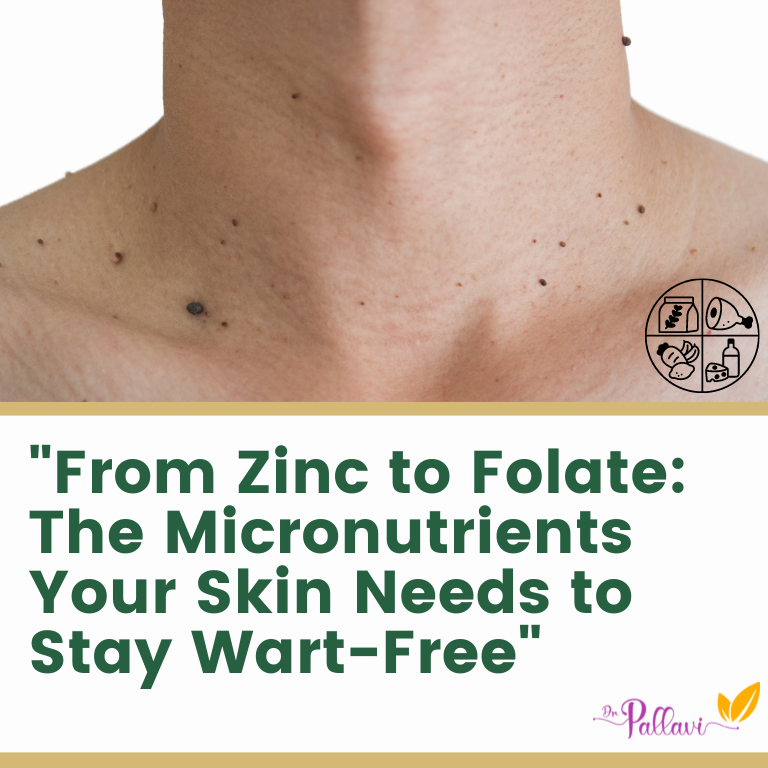
“From Zinc to Folate: The Micronutrients Your Skin Needs to Stay Wart-Free”
Warts are a common skin condition caused by a viral infection of the human papillomavirus (HPV). While warts are generally harmless and non-cancerous, they can be unsightly and uncomfortable.
Warts are a common skin condition caused by the human papillomavirus (HPV). They can appear anywhere on the body but are most often found on the hands, feet, and face. Warts are typically small, rough, and can be flesh-colored, brown, or gray. They are often described as having a cauliflower-like appearance.
There are several different types of warts, including:
- Common warts: These warts usually appear on the hands, fingers, or around the nails.
- Plantar warts: These warts appear on the soles of the feet and can be quite painful.
- Flat warts: These warts are small and flat and can appear in large numbers on the face, arms, or legs.
- Genital warts: These warts appear on the genital area and are transmitted through sexual contact.
What Causes Warts?
Warts are caused by the human papillomavirus (HPV), which is a common virus that can infect the skin and mucous membranes of the body. There are more than 100 types of HPV, and each type can cause a different type of wart. HPV is highly contagious and can spread through direct contact with an infected person or an object contaminated with the virus.
Warts can also spread from one part of the body to another through skin-to-skin contact or contact with contaminated surfaces.
Certain factors, such as a weakened immune system, can make a person more susceptible to developing warts. The virus can also spread through breaks in the skin, such as cuts or scrapes.
Some people are more prone to developing warts than others, and certain factors can increase your risk, such as having a weakened immune system or being in contact with someone who has warts.

Let’s look at some statistics and facts related to warts :
- Warts are common, affecting around 7-10% of the population at any given time (source: American Academy of Dermatology).
- There are over 100 strains of HPV, the virus that causes warts, and some strains are more likely to cause warts than others.
- Warts can appear on any part of the body, but are most common on the hands and feet.
- Warts can spread through direct contact with the virus or through contact with surfaces that have come into contact with the virus.
- Warts can be resistant to treatment and may require multiple treatment approaches.
- Warts can have a negative impact on quality of life, causing embarrassment or discomfort.
Including these statistics and facts can help provide context and perspective on the prevalence and impact of warts, and emphasize the need for effective and holistic treatment approaches.
Association of Metabolic disorders with Warts.

Some metabolic disorders can increase the risk of developing warts. For example, individuals with weakened immune systems, such as those with HIV/AIDS, are more susceptible to developing warts.
Additionally, individuals with diabetes may be more prone to developing warts due to changes in their immune function and blood flow.
Other metabolic disorders that have been associated with an increased risk of developing warts include:
- Hypothyroidism: A condition in which the thyroid gland does not produce enough thyroid hormone. This can weaken the immune system and make it easier for warts to develop.
- Iron Deficiency Anemia: A condition in which the body does not have enough iron. This can weaken the immune system and make it easier for warts to develop.
- Vitamin A Deficiency: A lack of vitamin A in the diet can weaken the immune system and increase the risk of developing warts.
It is important to note that while these metabolic disorders may increase the risk of developing warts, they do not always cause warts to develop. Additionally, there are many other factors that can increase the risk of developing warts, such as age, genetics, and environmental factors.
If you are concerned about the risk of developing warts, it is important to speak with your healthcare provider.
Micronutrients and Immune Function: The Role of Nutrition in Preventing and Treating Warts

The immune system is our body’s natural defense against harmful pathogens, including viruses that cause warts. While many factors influence immune function, including genetics, age, and environmental exposures, nutrition also plays a crucial role. Adequate intake of essential micronutrients, such as zinc, selenium, iron, copper, vitamins A, C, E, B6, B12, and folic acid, is critical to a healthy immune response.
Zinc, in particular, is an essential micronutrient that plays a key role in immune function. Zinc deficiency has been linked to impaired wound healing and reduced lymphocyte and phagocyte function, which can increase the risk of viral infections like warts.
In fact, studies have shown that patients with resistant warts lasting more than six months were more likely to have low serum zinc levels, indicating a possible association between zinc deficiency and persistent, progressive, or recurrent viral warts.
Selenium, another essential micronutrient, also plays a role in immune function. Selenium deficiency has been associated with impaired immune function and an increased risk of viral infections. Studies have shown that selenium supplementation can enhance immune function and reduce the risk of viral infections like influenza.
Vitamins A, C, and E are also important micronutrients that have antioxidant properties and help to support immune function. Vitamin A helps to maintain the integrity of the skin and mucosal membranes, which act as barriers against viral infections. Vitamin C plays a key role in immune function by enhancing the activity of immune cells and promoting the production of antibodies. Vitamin E is a potent antioxidant that helps to protect immune cells from oxidative damage.
Deficiencies in other micronutrients, such as iron, copper, and B vitamins, can also impair immune function and increase the risk of viral infections like warts. For example, folate deficiency can lower the body’s resistance to infections by reducing T lymphocyte proliferation, which is essential for a healthy immune response.
While adequate intake of micronutrients is essential for a healthy immune response, it is important to note that excessive intake of certain micronutrients, such as vitamin A and zinc, can also have negative effects on immune function.
Therefore, it is important to consume micronutrients in appropriate amounts and in balance with other nutrients.
In addition to maintaining an adequate intake of essential micronutrients, other lifestyle factors can also influence immune function and reduce the risk of viral infections like warts. These include getting enough sleep, managing stress, exercising regularly, and avoiding smoking and excessive alcohol consumption.
In conclusion, adequate intake of essential micronutrients is crucial for a healthy immune response. It may be necessary for preventing and treating viral infections like warts.
If you are concerned about the risk of developing warts or other viral infections, it is important to get blood tests done to help determine your nutritional deficiencies and recommend the appropriate treatment.
People should take warts seriously, especially if they are painful, spreading, or causing discomfort. A viral infection causes warts, and while they are generally not harmful, they can be contagious. They may require medical attention to prevent them from spreading or becoming more severe.
Some types of warts, such as genital warts, can also increase the risk of certain cancers. It is essential to seek medical advice if you have any concerns about warts, especially if they are causing pain or discomfort or if they are located in sensitive areas of the body.
Link between sun exposure & warts
While sun exposure is not a direct cause of warts, it can weaken your skin’s defenses and make you more susceptible to the human papillomavirus (HPV) that causes warts. The UV radiation from the sun can damage the DNA in your skin cells, which can impair your immune system’s ability to fight off viruses like HPV. In addition, spending time in humid, sweaty environments like pools or locker rooms, which are common places for warts to spread, can also increase your risk of getting infected.
That being said, it’s important to note that not everyone who is exposed to the sun or spends time in these environments will develop warts. The development of warts is a complex interplay of factors, including the strength of your immune system and your exposure to the virus.
To reduce your risk of getting warts, it’s important to protect your skin from excessive sun exposure and to maintain good hygiene practices in high-risk environments. This includes wearing sunscreen with a high SPF, covering up with clothing and hats, and avoiding sharing personal items like towels and shoes.
To prevent the recurrence of stubborn warts, there are a variety of natural remedies and holistic treatments that can help boost your immune system and promote healthy skin.
Homeopathy is a form of holistic medicine that can help in the treatment of warts. Homeopathic remedies are made from natural substances and are aimed at boosting the body’s immune system, which can help in the prevention and treatment of warts.
By addressing the underlying causes of the condition, homeopathy can provide long-term relief from warts without any harmful side effects. If you are struggling with warts and want to explore a holistic approach to treatment, consider consulting with a qualified homeopath. They can help determine the best course of treatment based on your individual needs and health history.
Here are some common homeopathic remedies that can help treat warts:
- Thuja Occidentalis: for soft, fleshy warts
- Antimonium Crudum: for hard, rough warts on hands or face
- Nitricum Acidum: for sensitive warts on fingers
- Causticum: for large, painful warts on face or hands
Remember, it’s essential to consult a qualified practitioner for a proper diagnosis and personalized treatment plan based on individual symptoms and constitution.
If you are struggling with persistent warts, moles, or other chronic skin issues, I am here to help you. As a holistic practitioner, I offer a natural and comprehensive approach to healing, focused on improving your overall health and strengthening your immune system. If you are interested in learning more, I invite you to schedule a discovery consultation with me by emailing contact@naturalskin.clinic. Together, we can create a personalized plan to help you achieve healthy, clear skin.
Thank you for reading today’s blog.
If you found it informative and helpful, please consider liking and sharing it with others who may benefit from this information. Also, make sure to subscribe to my blog for more updates and insights on holistic health and wellness.
Thank you for your support!
>>>>>>>>.
References:
https://pubmed.ncbi.nlm.nih.gov/18577057/
https://www.ncbi.nlm.nih.gov/pmc/articles/PMC7063548/
https://pubmed.ncbi.nlm.nih.gov/8073343/
